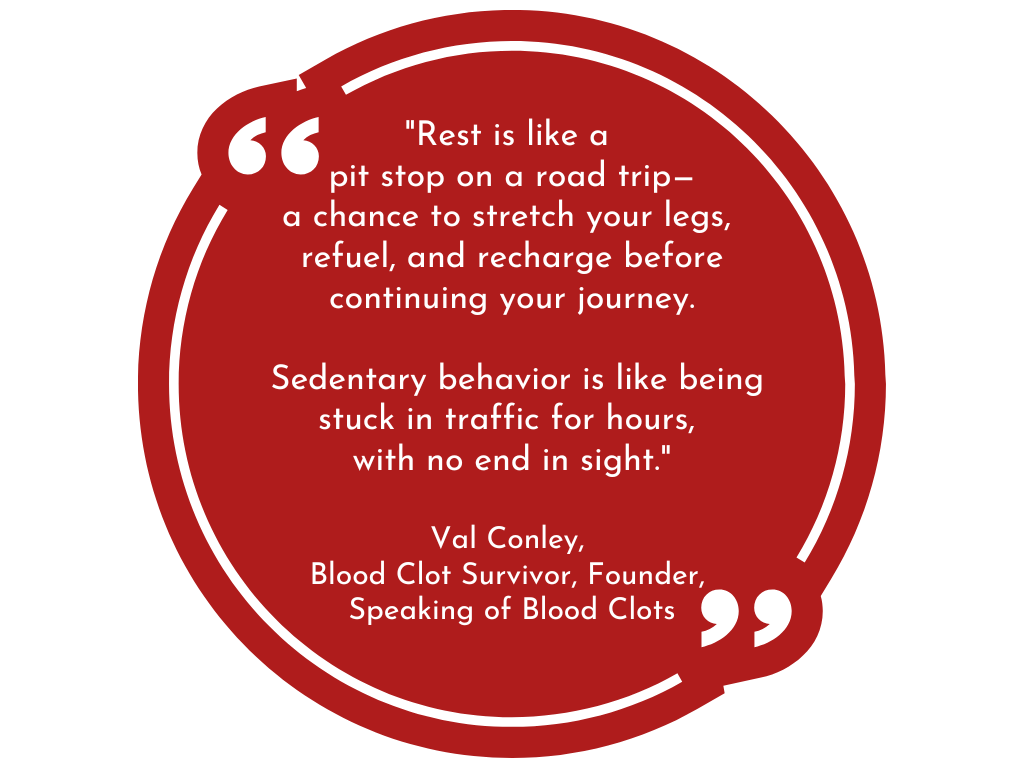Why Rest is Non-Negotiable for Blood Clot Recovery and Your Future Health
Ever feel like you're running on fumes, juggling a million things at once? You're not alone. As women, we often put everyone else's needs before our own, leaving little time for rest and recharge. But what if I told you that rest is not a luxury, but a necessity, especially when it comes to recovering from and preventing blood clots?
Rest vs. Sedentary: What's the Difference?
It's easy to confuse rest with being sedentary, but they're not the same.
- Rest is a conscious choice to recharge your mind and body. It's about setting aside time for activities that help you relax, recover, and restore your energy. Think of it as a pit stop on a long road trip—a chance to stretch your legs, refuel, and recharge before continuing your journey.
- Sedentary behavior is unintentional inactivity that often becomes a habit. It's about prolonged periods of sitting or lying down with minimal movement. Imagine being stuck in traffic for hours with no end in sight.
While rest is essential for your health, prolonged sedentary behavior can increase your risk of blood clots and other health problems.
The Power of Rest for Women's Health
Rest isn't just about getting enough sleep. It's about incorporating relaxation and stress management techniques into your daily routine to support your overall well-being. Here's how rest can benefit you:
- Prevention and Recovery:
- Reduces stress and anxiety, which can negatively impact your cardiovascular system and increase your risk of blood clots.
- Supports physical healing and allows your body to focus on repairing damaged tissues.
- Improves sleep quality, leading to deeper and more restorative sleep.
- Fitness Recovery:
- Promotes muscle growth and repair after exercise.
- Helps prevent injuries by allowing your body to adapt to the demands of exercise.
- Mental Well-being:
- Improves mood and emotional regulation, reducing the risk of anxiety, depression, and irritability.
- Increases resilience, enabling you to better cope with challenges and bounce back from setbacks.
- Women's Well-being:
- Sharpens cognitive function, supporting clear thinking, focus, and decision-making.
- Elevates mood and promotes a more positive outlook.
- Strengthens resilience to better cope with stress, challenges, and life transitions, including menopause.
Simple Ways to Incorporate Rest into Your Day
- Prioritize Sleep: Aim for 7-9 hours of quality sleep per night. Establish a regular sleep schedule, create a relaxing bedtime routine, and optimize your sleep environment.
Bonus Tip for Blood Clot Survivors: After my saddle pulmonary embolism, sleeping was difficult for me. The odds of waking up at 2 a.m. to know I was experiencing a cardiovascular event, was a miracle. I was terrified that I wouldn’t wake up if it happened again. Talk to your doctor if you're struggling with sleep and seek out counseling to give you the tools to manage and improve your mental health.
- Take Naps: Short naps (20-30 minutes) can work wonders for your energy and focus.
- Practice Relaxation Techniques: Try deep breathing exercises, meditation, or progressive muscle relaxation. There are many free resources and apps available to guide you.
- Gentle Movement: Engage in gentle movement like yoga, tai chi, or stretching. Even a short walk in nature can do wonders for your mind and body.
- Active Recovery: On days you exercise, incorporate light activities like walking or swimming to promote blood flow and recovery.
- Stretching and Foam Rolling: These can help improve flexibility, reduce muscle soreness, and prevent injuries.
- Listen to Your Body: Pay attention to your body's signals and take rest days when needed. Don't push yourself beyond your limits.
- Spend Time in Nature: Connect with nature by taking walks in the park, gardening, or simply sitting outside and enjoying the fresh air.
- Engage in Relaxing Activities: Make time for hobbies, creative pursuits, or activities that bring you joy and relaxation—reading, journaling, and prayer/meditation are all great options.
- Social Connection: Connect with loved ones, friends, or support groups.
- Mindful Movement: Engage in mindful movement practices like yoga or tai chi.
- Self-Care Rituals: Create self-care rituals that nourish your mind, body, and soul. This could include taking a bath, reading a book, listening to music, or spending time in nature.
- Set Boundaries: Learn to say "no" to requests and commitments that drain your energy or don't align with your priorities.
IMPORTANT NOTE: Be sure to clear activities with your health care provider. Some hobbies that you enjoy may require protective gear and precautions to limit your risk of bleeding - even foam rollers can be an issue if you easily bruise on your anticoagulant (“blood thinner”)
Rest is Your Superpower
Rest is not a sign of weakness; it's a sign of strength. It's an essential part of taking care of yourself, so you can show up at your best in all areas of your life.
Challenge: Schedule at least 30 minutes of dedicated rest this week. Choose an activity that truly helps you relax and recharge. Notice how you feel afterward and commit to making rest a regular part of your routine. You deserve it!

